From Dreamers to Parasites: A Love Letter to the Glorious Fall of Tech

The 1990s. A simpler time when modems screeched like tortured cats, websites looked like PowerPoint vomit, and the future was full of awkward optimism. We built things, dammit. We shared things. We gathered in IRC chatrooms, built open-source projects nobody paid us for, and wore trench coats not because we wanted to shoot up schools, but because Neo made it look cool. It was the dawn of something brilliant.
We were the weirdos, the LAN-party basement-dwellers, the sweaty-palmed cyberpunks who believed the Internet would liberate humanity, not farm its eyeballs for ad revenue.
Fast forward to 2025, and our precious field of computer science has been colonised by a fleet of Patagonia-wearing techno-cryptobros who read Ayn Rand unironically and think replacing 200,000 office workers with a chatbot that plagiarises Wikipedia is a stroke of visionary genius.
Bravo.
You see, once upon a time, being a "techie" meant you were probably socially awkward, underpaid, and genuinely trying to build a better world. Now? Now it means you’re either trying to mint the next Ponzi coin or figuring out how to automate empathy out of the workplace. We’ve gone from "Information Superhighway" to "McKinsey But With GPUs."
Let’s be honest: AI today isn’t being developed by idealists. It’s being driven by men who use phrases like “disruption” and “hypergrowth” without even flinching. Their dream? A glorious, buzzing server farm the size of Belgium, consuming more electricity than Ireland, pumping out novelty porn filters and productivity apps that help you schedule your fifth redundancy meeting for the week.
These are the kind of people who think Her was a romcom instead of a documentary.
They’re not engineers, they’re reverse alchemists. Whatever they touch turns to absolute, Grade-A shite. Blockchain? Could've been useful. Decentralised trust! New economic models! But no, we got JPEGs of monkeys selling for the GDP of Tuvalu and a legion of Twitter "investors" who think taxation is theft.
And now they're swarming AI. The same locusts, just with larger GPUs.
Do they care about the massive social dislocation their tools might cause? Of course not. They're too busy giving TED talks titled “Why Making Everyone Unemployed is Actually a Net Positive” and selling self-help books with titles like GrindGPT: Outsource Your Soul.
Meanwhile, society's left wondering: “Wait… if ChatGPT replaces all the writers, and Midjourney replaces the artists, and AI replaces the coders, who’s going to buy anything?” But don’t worry, they’re working on that too. They’ll just spin up a few hundred thousand AI consumers in the metaverse who will gladly watch ads for AI-manufactured toothpaste in a loop until the end of time.
And for the human beings? Well, there’s always prompt engineering. Or, failing that, being "reskilled" into whatever bullshit job the next buzzword needs. Because if there's one thing these parasites excel at, it's making you responsible for your own obsolescence.
What happened to the dream?
Where are the quirky sysadmins and GNU nerds, the anarchist coders who believed in freedom, the floppy-disc-toting hackers who wore Doc Martens and got high off the smell of fresh solder? Gone. Replaced by VC-funded pseudo-gods who think “open-source” means giving you a UI and charging £29.99/month to remove the watermark.
It’s poetic, really. We built machines to liberate ourselves, and we ended up building a feudal system where the new aristocracy is a bunch of man-children who named their startup after a Norse rune and think ethics is a CPU bottleneck.
So, cheers to the tech revolution. May our new overlords enjoy their obscene wealth, uninterrupted by the cries of the jobless or the ethics committees they forgot to invite.
And to those of us who remember when computing was about curiosity, not conquest, well, we’ll always have our Zip drives, our dusty ThinkPads, and the sweet, sweet sound of a dial-up modem.
God save the Queen. Oh wait, she’s dead too.




